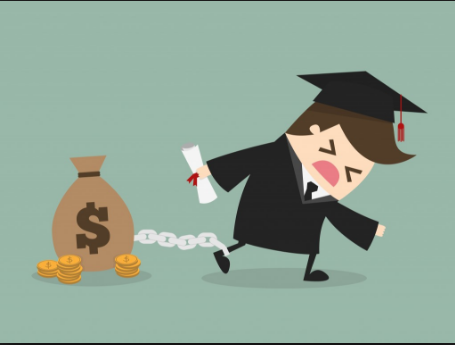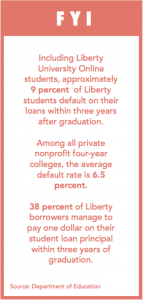Loan refinancing bill gets rejected
Two bills that aimed to provide college graduates a state-operated entity to refinance student loans were rejected in January by a Virginia House Appropriations Committee.
The bills would have re-established the Virginia Education Loan Authority, which would have sought to compete with federal and private loans by administering lower interest rates, allowing graduates to pay off the loans faster.
Del. Marcus Simon (D-Fairfax), who sponsored one of the bills, said the entity would have been available to assist more than 600,000 Virginia borrowers, both recent graduates and those who have had the loans for even
five or 10 years.
Rachel Myers, senior supervisor of communications for Liberty University Student Financial Services, said an entity such as this would require financial capital to back refinancing loans.
“Any method would require a sizable source of money to put up as collateral against the loans being refinanced,” Myers said.
“It would also require start-up dollars to administer the program in a year in which state officials are looking for ways to cut spending.”
If it had been created, Simon said the state authority would have been able to refinance student loans at lower rates.
“The student loan authority could say, ‘Our mission is not to make money,’” Simon said.
“‘Our mission is to have them pay off their student loan debt as quickly as they can and as cheaply as they can so they can participate.’”
Simon said graduates should be able to invest in local economies as opposed to being focused on their loans longer than necessary.
This participation would reward the entire community in the end.
“We all benefit from a stronger Virginia economy,” Simon said.
“If helping students out makes the economy stronger then that’s good for all of us. So I think it’s worth the small amount of risk we ask the taxpayers to make.”
Myers agreed that having students with high interest loans refinanced at lower rates would free up discretionary income.
“It may … cause the person to delay buying a house, travel, or invest in retirement plans – all of which stimulates the economy,” Myers said.
“This pattern of less spending and investing impacts the nation as a whole as well, just on a larger scale.”
Myers said the drawbacks must be considered as well.
“But the reality of the risks of additional debt and liability to taxpayers, the risk of current borrowers losing already-generous federal terms and the risk of the State trying to compete with an already-adept private market do not, in my estimation, outweigh the benefits of this public policy proposal,” Myers said.
The Virginia House of Delegates is controlled by Republicans, who largely
opposed the bills.
In an interview with The Cavalier Daily, Del. Jimmie Massie (R-Henrico) said loans should be left to the private sector and are not a core function of the government.
However, Massie said since the federal government created this situation, it should be its responsibility, not the state’s, to fix it.
“The federal government was an irresponsible lender,” Massie said.
“When a bank makes a bad loan, that bank needs to deal with the problem. The Obama administration and the Democrats in Congress in 2010, they created this problem, and they should deal with it.”
The bill being rejected was due to partisan politics, Simon said, citing the flat no and lack of follow-up conversation from Republicans.
“Being a member of the minority part, from Northern Virginia, who’s relatively new, did I think that my bill would be the one to sail through?” Simon asked.
“Maybe not. But I thought I would’ve got more cooperation and more interest from Republicans on the other side in pursuing the idea.”
Massie told The Virginia Cavalier that he expects President Donald Trump, with his expert knowledge in borrowing from banks, to be able to address student loans on a one-by-one basis.
Simon said he plans to return next year with a new approach and see if he can get the bill through.
In addition, Simon said preventative measures should be taken by educating high school students on loans before 18-year-olds enter such a major transaction.
“To ask to them to read a bunch of paperwork, sign on the dotted line, and understand it all, I don’t think is particularly fair,” Simon said.
Students and graduates who have already taken on debt can still handle their loans wisely.
Myers said students should pay their loans on time, seek extensions and income based plans with discernment, and only if necessary, find jobs that help pay the loans off and research credible options in the private market that may provide lower interest rates.

